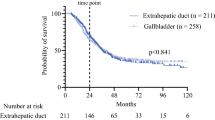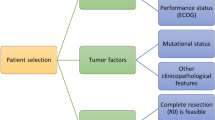Abstract
Background
The indications for neoadjuvant chemotherapy (NAC) in resectable colorectal liver metastases (CRLMs) remain unclear. Tumor burden score (TBS) is a prognostic tool based on tumor size and number of tumors. However, its utility in the NAC setting for initially resectable CRLM has never been investigated.
Methods
TBS is a distance from the origin on a Cartesian plane to the coordinates (x, y) = (tumor size in centimeter, number of tumors). TBS < 3 was defined as “TBS-low”, whereas TBS ≥ 3 as “TBS-high”. Between 2008 and 2018, 102 patients who underwent hepatectomy for resectable CRLM were retrospectively analyzed using the Kaplan–Meier method and Cox proportional hazards regression models.
Results
Among the TBS-low (n = 46) and TBS-high (n = 56) groups, baseline patient characteristics were mostly similar except for TBS-related parameters. NAC was more frequently administered in the TBS-high group (p = 0.038). The overall survival (OS) rates were similar between the two groups. Subgroup analysis showed that NAC was associated with non-significantly improved 5-year OS in the TBS-high group [76.1% with NAC and 54.9% without NAC (p = 0.093)]. In multivariate analysis, NAC was an independent prognostic factor for favorable OS only in the TBS-high group, while adjuvant chemotherapy (AC) was associated with improved OS only in the TBS-low group.
Conclusion
In patients with resectable CRLM, the TBS-high population had a survival benefit from NAC, while the TBS-low population benefited from AC. TBS may serve as an indicator for patients who will benefit from NAC.



Similar content being viewed by others
References
House MG, Ito H, Gönen M et al (2010) Survival after hepatic resection for metastatic colorectal cancer: trends in outcomes for 1600 patients during two decades at a single institution. J Am Coll Surg 210:744–752
Kopetz S, Chang GJ, Overman MJ et al (2009) Improved survival in metastatic colorectal cancer is associated with adoption of hepatic resection and improved chemotherapy. J Clin Oncol 27:3677–3683
Khatri VP, Petrelli NJ, Belghiti J (2005) Extending the frontiers of surgical therapy for hepatic colorectal metastases: is there a limit? J Clin Oncol 23:8490–8499
Choti MA, Sitzmann JV, Tiburi MF et al (2002) Trends in long-term survival following liver resection for hepatic colorectal metastases. Ann Surg 235:759–766
Khoo E, O’Neill S, Brown E et al (2016) Systematic review of systemic adjuvant, neoadjuvant and perioperative chemotherapy for resectable colorectal-liver metastases. HPB (Oxford) 18:485–493
Nigri G, Petrucciani N, Ferla F et al (2015) Neoadjuvant chemotherapy for resectable colorectal liver metastases: what is the evidence? results of a systematic review of comparative studies. Surgeon 13:83–90
Nordlinger B, Sorbye H, Glimelius B et al (2008) Perioperative chemotherapy with FOLFOX4 and surgery versus surgery alone for resectable liver metastases from colorectal cancer (EORTC Intergroup trial 40983): a randomised controlled trial. Lancet 371:1007–1016
Nordlinger B, Sorbye H, Glimelius B et al (2013) Perioperative FOLFOX4 chemotherapy and surgery versus surgery alone for resectable liver metastases from colorectal cancer (EORTC 40983): long-term results of a randomised, controlled, phase 3 trial. Lancet Oncol 14:1208–1215
Hokuto D, Nomi T, Yasuda S et al (2018) Risk factors for unresectable recurrence after up-front surgery for colorectal liver metastasis. World J Surg 42:884–891
Ayez N, van der Stok EP, Grünhagen DJ et al (2015) The use of neo-adjuvant chemotherapy in patients with resectable colorectal liver metastases: clinical risk score as possible discriminator. Eur J Surg Oncol 41:859–867
Tanaka K, Adam R, Shimada H et al (2003) Role of neoadjuvant chemotherapy in the treatment of multiple colorectal metastases to the liver. BJS 90:963–969
Beppu T, Sakamoto Y, Hasegawa K et al (2012) A nomogram predicting disease-free survival in patients with colorectal liver metastases treated with hepatic resection: multicenter data collection as a project study for hepatic surgery of the Japanese society of hepato-biliary-pancreatic surgery. J Hepatobiliary Pancreat Sci 19:72–84
Konopke R, Kersting S, Distler M et al (2009) Prognostic factors and evaluation of a clinical score for predicting survival after resection of colorectal liver metastases. Liver Int 29:89–102
Rees M, Tekkis PP, Welsh FK et al (2008) Evaluation of long-term survival after hepatic resection for metastatic colorectal cancer: a multifactorial model of 929 patients. Ann Surg 247:125–135
Nagashima I, Takada T, Adachi M et al (2006) Proposal of criteria to select candidates with colorectal liver metastases for hepatic resection: comparison of our scoring system to the positive number of risk factors. World J Gastroenterol 12:6305–6309
Iwatsuki S, Dvorchik I, Madariaga JR et al (1999) Hepatic resection for metastatic colorectal adenocarcinoma: a proposal of a prognostic scoring system. J Am Coll Surg 189:291–299
Fong Y, Fortner J, Sun RL et al (1999) Clinical score for predicting recurrence after hepatic resection for metastatic colorectal cancer: analysis of 1001 consecutive cases. Ann Surg 230(3):309–318
Nordlinger B, Guiguet M, Vaillant JC et al (1996) Surgical resection of colorectal carcinoma metastases to the liver. A prognostic scoring system to improve case selection, based on 1568 patients. Association Francaise de Chirurgie Cancer 77:1254–1262
Zakaria S, Donohue JH, Que FG et al (2007) Hepatic resection for colorectal metastases: value for risk scoring systems? Ann Surg 246:183–191
Sasaki K, Morioka D, Conci S et al (2018) The tumor burden score: a new, “metro-ticket” prognostic tool for colorectal liver metastases based on tumor size and number of tumors. Ann Surg 267:132–141
Ayez N, van der Stok EP, de Wilt H et al (2015) Neo-adjuvant chemotherapy followed by surgery versus surgery alone in high-risk patients with resectable colorectal liver metastases: the CHARISMA randomized multicenter clinical trial. BMC Cancer 15:180
Portier G, Elias D, Bouche O et al (2006) Multicenter randomized trial of adjuvant fluorouracil and folinic acid compared with surgery alone after resection of colorectal liver metastases: FFCD ACHBTH AURC 9002 trial. J Clin Oncol 24:4976–4982
Kato T, Uehara K, Maeda A et al (2015) Phase II multicenter study of adjuvant S-1 for colorectal liver metastasis: survival analysis of N-SOG 01 trial. Cancer Chemother Pharmacol 75:1281–1288
Mitry E, Fields AL, Bleiberg H et al (2008) Adjuvant chemotherapy after potentially curative resection of metastases from colorectal cancer: a pooled analysis of two randomized trials. J Clin Oncol 26:4906–4911
Mukai T, Uehara K, Goto H et al (2017) Phase II trial of neoadjuvant chemotherapy with S-1 and oxaliplatin plus bevacizumab for colorectal liver metastasis (N-SOG 05 trial). Jpn J Clin Oncol 47:597–603
Margonis GA, Sasaki K, Gholami S et al (2018) Genetic and morphological evaluation (GAME) score for patients with colorectal liver metastases. Br J Surg 105:1210–1220
Primrose J, Falk S, Finch-Jones M et al (2014) Systemic chemotherapy with or without cetuximab in patients with resectable colorectal liver metastasis: the New EPOC randomised controlled trial. Lancet Oncol 15:601–611
Funding
No financial support was received for this study.
Author information
Authors and Affiliations
Corresponding author
Ethics declarations
Conflict of interest
None of the authors had any declaration or interests.
Ethical approval
All the procedures performed in studies involving human participants were in accordance with the ethical standards of the institutional and/or national research committee and with the 1964 Helsinki Declaration and its later amendments or comparable ethical standards.
Informed consent
This study was retrospective observational study. Therefore, informed consent was not obtained from all individual participants included in the study and it was approved by the Nagoya University Hospital Institutional Review Board.
Additional information
Publisher's Note
Springer Nature remains neutral with regard to jurisdictional claims in published maps and institutional affiliations.
About this article
Cite this article
Yonekawa, Y., Uehara, K., Mizuno, T. et al. The survival benefit of neoadjuvant chemotherapy for resectable colorectal liver metastases with high tumor burden score. Int J Clin Oncol 26, 126–134 (2021). https://doi.org/10.1007/s10147-020-01793-9
Received:
Accepted:
Published:
Issue Date:
DOI: https://doi.org/10.1007/s10147-020-01793-9




